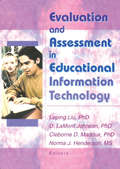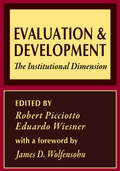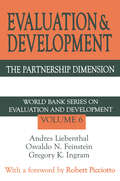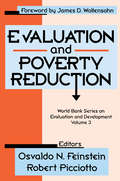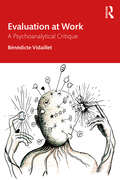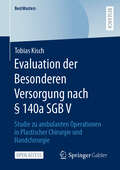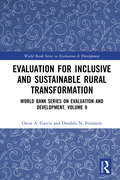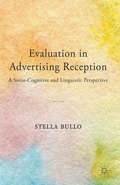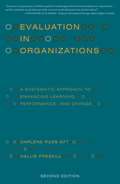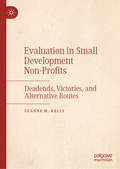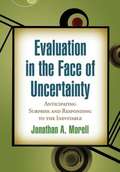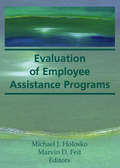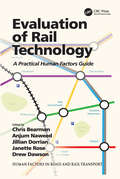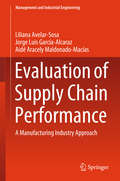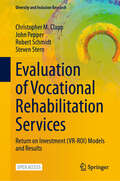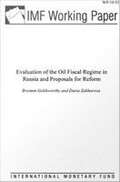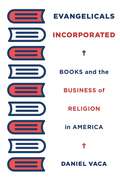- Table View
- List View
Evaluation and Assessment in Educational Information Technology
by Cleborne D Maddux D Lamont Johnson Leping Liu Norma HendersonChoose the right hardware and software for your school!This unique book is the first systematic work on evaluating and assessing educational information technology. Here you?ll find specific strategies, best practices, and techniques to help you choose the educational technology that is most appropriate for your institution. Evaluation and Assessment in Educational Information Technology will show you how to measure the effects of information technology on teaching and learning, help you determine the extent of technological integration into the curriculum that is best for your school, and point you toward the most effective ways to teach students and faculty to use new technology.Evaluation and Assessment in Educational Information Technology presents: a summary of the last ten years of assessment instrument development seven well-validated instruments that gauge attitudes, beliefs, skills, competencies, and technology integration proficiencies two content analysis instruments for analyzing teacher-student interaction patterns in a distance learning setting an examination of the best uses of computerized testing--as opposed to conventional tests, as used in local settings, to meet daily instructional needs, in online delivery programs, in public domain software, and available commercial and shareware options successful pedagogical and assessment strategies for use in online settings a four-dimensional model to assess student learning in instructional technology courses three models for assessing the significance of information technology in education from a teacher?s perspective an incisive look at Michigan?s newly formed Consortium of Outstanding Achievement in Teaching with Technology (COATT) ways to use electronic portfolios for teaching/learning performance assessment and much more!
Evaluation and Development: The Institutional Dimension (World Bank Series On Evaluation And Development Ser.)
by Eduardo WiesnerThis study illustrates the social and political principal that institutions matter. It explores not only how to get institutions to work efficiently, but also how to assess the proper relationship between institutions and development challenges through evaluative techniques.
Evaluation and Development: The Partnership Dimension World Bank Series on Evaluation and Development (World Bank Series On Evaluation And Development Ser. #Vol. 6)
by Osvaldo N. Feinstein Andres Liebenthal Gregory K. IngramPartnership is of growing importance in development work. Partnerships among state, private business, and civil society organizations are increasingly used to deliver the goods and services required for balanced growth and poverty reduction. Aid activities have shifted from a project focus to a more strategic and holistic focus on programs, sectors, and policies. With this new orientation, partnerships are often essential to deal with the added complexity and the larger number of agencies, groups, and stakeholders involved.The Partnership Dimension takes on the issues in a series of chapters divided into two general parts: Part 1, "Foundations of Partnership and Their Evaluation," covers the types of development partnership and critical issues involved, and Part 2, "Partnerships in Practice," then illustrates the aspects and lessons of partnership experience through a series of case studies. Many of the studies focus on the benefits of partnerships between institutions of government and civil society. Benefits include effective knowledge transfer, greater cross-national cooperation, the creation of new networks and capacity, and penetration of new markets. Private firms use partnerships with competitors to learn or reduce risk.There is much to learn about when, where, and how best to use partnerships, and, in particular, partnerships that involve less traditional combinations of actors, such as global partnerships for public policy, country-focused aid partnerships, private sector partnerships for knowledge creation, and partnerships for community development involving business, nongovernmental organizations, and government.Relatively little is known about the costs and benefits, and the risks and rewards, of different types of partnerships, or about how best to conduct partnerships for different purposes. This is why the current volume in the World Bank series is relevant for both development practitioners and policy analysts.
Evaluation and Poverty Reduction: Proceedings From A World Bank Conference (Commodity Working Papers #Vol. 3)
by Osvaldo N. FeinsteinIn his foreword, the president of the World Bank, James D. Wolfensohn, states plainly and precisely the rationale for this volume. "Evaluation is a central aspect of any poverty reduction endeavor. Evaluation implies that we have adopted a methodology that allows us to look in an effective way at the results of what we are doing so that we can, in turn, adapt our future actions toward the effective achievement of our goals. Evaluation adds value if we can learn something useful from it. It is not just a scorecard. It is something that helps us change our behavior or influence the behavior of others."This high powered collection of papers illustrates this statement. The network of world class scholars and development practitioners covers the gamut from methodological issues to policy concerns with respect to participatory evaluation, poverty reducing growth, macro and micro levels of intervention, health, nutrition and population programs, social inclusion and the changing role of the civil society. The participants include major figures, including a Nobel Laureate as well as cutting edge policy makers. Poverty reduction is examined in innovative ways-utilizing state of the art techniques of the social and economic sciences.The editors and contributors emphasize "what works" in poverty reduction programs. They point to making interventions context specific with a holistic vision of the problem. Contributors emphasize social funds and safety nets, social services, crisis prevention, informal social security and insurance systems, anti-corruption programs, mobilization of the poor, and ultimately, the creation, where none existed in the past, of a workable civil society. In short, this volume lies at the intersection of development economics and political economy. It seeks to promote development effectiveness through social learning and problem solving.The volume is unabashedly focussed on pro-poor growth. It has its roots in a conference sponsored by the Operations Evaluation Department, an independent unit within the World Bank. The goals of evaluation are to learn from experience, to provide an objective basis for assessing the results of the Bank's work, and to provide accountability in the achievement of its objectives.Osvaldo N. Feinstein is a manager, and Robert Picciotto, director general of the Operations Evaluation Department. The World Bank is located in Washington, D.C. with offices throughout the developing world.
Evaluation at Work: A Psychoanalytical Critique
by Bénédicte VidailletEvaluation at work has attracted much criticism and its damaging effects are well known, so why does it continue to gain ground in every field? Evaluation at Work: A Psychoanalytical Critique offers an original answer to this question: evaluation spreads because we want to be evaluated. Developing a critical reflection from a psychoanalytic perspective, it argues that workers are not mere victims of evaluation systems but are complicit in them. In this fascinating volume, Bénédicte Vidaillet focuses on the aspects of our subjectivity that come into play in evaluation at work —our expectations, desires, need for recognition, our conceptions of ourselves at work, as well as our relationship with others such as colleagues, managers or clients — to explore how evaluation affects us, where it gets its evocative power, and what it stirs within us to make us want it, despite its detrimental effects in its currently practiced form. Chapters draw on real-life examples, case studies from a variety of organizations, and observations from clinical practice, to provide insight into the many mechanisms that have enabled evaluation to spread unimpeded through our subjective complicity in the process, revealing how they came to seem so innocuous. This book will be of interest to scholars studying the topic of evaluation at work from a critical perspective as well as professionals who use evaluation systems or are under the pressure of evaluation in all sectors and organizations. By exposing the psychological mechanisms that evaluation uses to appeal to us, it gives each of us the tools we need to break free of its grasp.
Evaluation der Besonderen Versorgung nach § 140a SGB V: Studie zu ambulanten Operationen in Plastischer Chirurgie und Handchirurgie (BestMasters)
by Tobias KischIn diesem Open-Access-Buch werden die politischen Ziele der Ambulantisierung und der sektorengleichen Vergütung den aktuellen Herausforderungen in der Chirurgie gegenübergestellt. Die unzureichend an die steigenden Kosten angepasste Vergütung spiegelt sich in einem signifikanten Rückgang des Reinertrags chirurgischer Einzelpraxen wider. Als Folge sinkt die Zahl ambulanter Operationen (AOPs). Die Ergebnisse der vorliegenden Studie zeigen, dass die Besondere Versorgung den Herausforderungen begegnen, die Ergebnisqualität verbessern und Sektorengrenzen aufbrechen sowie die Ambulantisierung bei geringerer Einflussnahme auf medizinische Entscheidungen und deutlich höherer Vergütung ausbauen kann. Als Handlungsempfehlung resultiert ein Ersatz der auf Soll-Werten basierenden Einzelleistungsvergütungen durch modifizierte Hybrid-DRGs mit regelmäßig aufwandsorientierten Vergütungsanpassungen für Krankenhäuser und Vertragsärzte mit/ohne Krankenhausanbindung. Findet eine Umsetzung in der Regelversorgung nicht statt und bestehen weiterhin keine finanziellen Anreize, können laufende Projekte der Besonderen Versorgung weiter ausgebaut werden.
Evaluation for Inclusive and Sustainable Rural Transformation: World Bank Series on Evaluation and Development, Volume 9 (World Bank Series on Evaluation & Development)
by Oscar A. García Osvaldo N. FeinsteinWritten by a team of expert practitioners at the Independent Office of Evaluation of IFAD, this book gives an overview of evaluation practice at IFAD. It looks at how evaluation practice has evolved to reflect, respond to and inform changing expectations of development assistance. It reveals how evaluation products and methodologies have benefited from key reviews, revisions and lessons learned, and also how they have progressively strengthened IFAD’s capacity to assess its operations and better understand its results. The book concludes with reflections on some of the challenges that lie ahead, including how the independent evaluation function can continue to evolve to meet future challenges and enhance the impact of development initiatives on people’s lives. This valuable insight into practice will be of interest to researchers, practitioners and policymakers in development economics, development studies and rural studies.
Evaluation in Advertising Reception
by Stella BulloPlaced within the context of reception studies, this book investigates how advertisements that rely on re-contextualising shared cultural knowledge are understood by their viewers, and examines their persuasive potential.
Evaluation in Organizations: A Systematic Approach to Enhancing Learning, Performance, and Change (Research Methods For The Social Sciences Ser.)
by Darlene Russ-EftFrom new product launches to large-scale training initiatives, organizations need the tools to measure the effectiveness of their programs, processes, and systems. In Evaluation in Organizations, learning theory experts Darlene Russ-Eft and Hallie Preskill integrate the most current research with practical applications to provide a fully revised new edition of this essential resource for managers, human resource professionals, students, and teachers.
Evaluation in Small Development Non-Profits: Deadends, Victories, and Alternative Routes
by Leanne M. KellyResearch on evaluation shows that low-use and non-use of evaluation is common, yet evaluation is hailed as beneficial and worthwhile. The worth of evaluation is tied to its utilisation, presenting a paradox if evaluation is both revered and underutilised. This book investigates this paradox in the under-researched context of small development non-profit organisations, which have specific resource constraints and ‘bottom up’ community development values that complicate their ability to do and use evaluation in line with top down directives. The book examines the utility, meaningfulness, and purpose of evaluation from small non-profit perspectives, and explores whether evaluation has value for these organisations. For development practice, it presents evaluative alternatives that reconceptualise evaluation as part of the active process of development rather than as an interval-based add-on. For evaluation theory, it highlights a historical preoccupation with improving evaluation without assessing its inherent worth, and considers alternative ways to enhance the value of evaluation for small non-profits.
Evaluation in Sport and Leisure (Advances in Leisure Studies)
by Andrew AdamsThis book presents a critical assessment of evaluation theory and practice in sport and leisure. It considers established and emerging forms of evaluation; examines typologies, issues, contexts and processes, and asks how evaluation practice can be improved in the future. The book seeks to uncover some of the tensions and dilemmas that are present in choosing and applying evaluation strategies. It considers the relationship between evaluation, context and evaluator to discern how and why a particular strategy is employed. It also highlights how power relationships affect and effect the evaluation process itself as well as those involved in conducting evaluations. The book encourages the reader to challenge accepted methodologies in evaluation, whilst acknowledging the central importance of evaluation and evidence for our understanding of the social impact and value of sport and leisure. This book is important reading for any student, researcher, practitioner or policy maker with an interest in sport, leisure and society, sport and leisure management, policy or development, leisure studies, or the wider relationship between sport, leisure, wellbeing and society.
Evaluation in the Face of Uncertainty
by Jonathan MorellUnexpected events during an evaluation all too often send evaluators into crisis mode. This insightful book provides a systematic framework for diagnosing, anticipating, accommodating, and reining in costs of evaluation surprises. The result is evaluation that is better from a methodological point of view, and more responsive to stakeholders. Jonathan A. Morell identifies the types of surprises that arise at different stages of a program's life cycle and that may affect different aspects of the evaluation, from stakeholder relationships to data quality, methodology, funding, deadlines, information use, and program outcomes. His analysis draws on 18 concise cases from well-known researchers in a variety of evaluation settings. Morell offers guidelines for responding effectively to surprises and for determining the risks and benefits of potential solutions.
Evaluation of Employee Assistance Programs
by Marvin D Feit Michael J HoloskoThis timely book brings together for the first time critical information about the evaluation of employee assistance programs. Although EAPs have existed for over 40 years, the assessment of their value has been fragmented. Contributors to this new volume--blending practical and academic insights--document concerns, address the newer issues and developments in the field of EAPs, and present case examples of actual evaluations. The range and diversity of topics reflect EAPs in transition, their growth patterns, evaluation needs, and evaluation methods. Overall, this important volume emphasizes that successful evaluations depend not only on methodological expertise but a consideration of much broader salient and societal issues.
Evaluation of Prolonged Use of IMF Resources
by International Monetary FundA report from the International Monetary Fund.
Evaluation of Rail Technology: A Practical Human Factors Guide (Human Factors in Road and Rail Transport)
by Jillian Dorrian Anjum Naweed Janette RoseRapid advancements in train control and in-cab technologies provide significant opportunities for rail operators to improve efficiency and enhance their operations. New technologies often provide elegant solutions to existing problems or new capabilities for the operator. However, new technologies may also represent a significant form of risk. Thus, it is important to balance the potential for significant improvement with justifiable concern about how the technology may unpredictably change the nature of the work. If a technology is designed and implemented without considering the substantive human factors concerns, that technology may lead to unintended consequences that can introduce safety issues and disrupt network performance. It is important to note that even a well-designed and beneficial technology may be rejected by the users who see it as a threat to their jobs, status or working conditions. This book discusses the issues surrounding rail technology and introduces a ’toolkit’ of human factors evaluation methods. The toolkit provides a practical and operationally focused set of methods that can be used by managers considering investing in technology, staff charged with implementing a technology, and consultants engaged to assist with the design and evaluation process. This toolkit can help to ensure that new rail technologies are thoughtfully designed, effectively implemented, and well received by users so that the significant investment associated with developing rail technologies is not wasted.
Evaluation of Supply Chain Performance: A Manufacturing Industry Approach (Management and Industrial Engineering)
by Jorge Luis García-Alcaraz Aidé Aracely Maldonado-Macías Liliana Avelar-SosaThis book provides some regional aspects considered by manufacturing firms in their decisions to gain competitiveness and have effects on the performance of their supply chains (SC). Some of the main aspects considered are: government's policies, fixed costs, the availability and quality of infrastructure services. This book also discusses the risks for the SC; based on a perception approach, some aspects studied are: demand, suppliers and production processes and how these are related to other elements of the SC. The authors use structural modeling to analyze the evaluation of some manufacturing practices and their impact on customer service satisfaction, agility and flexibility of the SC. The context of this study is immersed in the Mexican manufacturing industry of exportation, also known as maquiladora industry of Ciudad Juarez, México. This borderland is among the top 10 manufacturing Mexican cities. World class industries are located in this region and have been recognized around the world for their competitiveness and high performance. Therefore, the methods and results exposed in this book may be valuable and useful for readers and researchers of the SC worldwide.
Evaluation of Vocational Rehabilitation Services: Return on Investment (VR-ROI) Models and Results (Diversity and Inclusion Research)
by Robert Schmidt Steven Stern John Pepper Christopher M. ClappThis open book presents the latest advances in models and data for evaluating the efficacy of vocational rehabilitation (VR) services provided to individuals with disabilities. For the first time, the VR-ROI (return on investment) model is used to simultaneously compare short- and long-term labor market outcomes across multiple state agencies and four distinct disability groups. For each disability group, the book provides information about the return on investment, as measured by the rate of return, for VR services. By offering this broad and in-depth evaluation in concert with intuitive explanations of the model and the estimation methodology, the book helps to bridge the gap between research and practice and to equip stakeholders with data-driven insights to enhance vocational rehabilitation programs for individuals with disabilities. This is an open access book.
Evaluation of the Lovell Federal Health Care Center Merger: Findings, Conclusions, and Recommendations
by Committee on Evaluation of the Lovell Federal Health Care Center MergerThe 2010 opening of the Captain James A. Lovell Federal Health Care Center (FHCC) created a joint entity between the Department of Defense (DoD) and the Department of Veterans Affairs (VA) that replaced two separate centers in North Chicago. VA and DoD leaders envisioned a state-of-the-art facility that would deliver health care to both DoD and VA beneficiaries from northern Illinois to southern Wisconsin, providing service members and veterans seamless access to an expanded array of medical services. Unprecedented for the military and the VA, the Lovell FHCC would integrate clinical and administrative services under a single line of authority. The DoD asked the IOM to evaluate whether the Lovell FHCC has improved health care access, quality, and cost for the DoD and the VA, compared with operating separate facilities, and to examine whether patients and health care providers are satisfied with joint VA/DoD delivery of health care. Evaluation of the Lovell Federal Health Care Center Merger: Findings, conclusions, and Recommendations finds that initial implementation of the Lovell FHCC has provided important lessons about how to integrate VA and DoD health care services and has identified remaining obstacles that the departments could overcome to make such mergers more effective and less costly to implement. The IOM recommends that the VA and the DoD develop a comprehensive evaluation plan to objectively judge its success or failure, with measurable criteria, that would provide essential knowledge for both the Lovell FHCC and future endeavors.
Evaluation of the New York City Police Department Firearm Training and Firearm-Discharge Review Process
by Bernard D. Rostker Andrew R. Morral Carl Jensen William M. Hix Lawrence M. HanserIn January 2007, New York City Police Commissioner Raymond W. Kelly asked the RAND Corporation to examine the quality and completeness of the New York City Police Department's firearm-training program and identify potential improvements in it and in the police department's firearm-discharge review process. This monograph reports the observations, findings, and recommendations of that study.
Evaluation of the Oil Fiscal Regime in Russia and Proposals for Reform
by Daria Zakharova Brenton GoldsworthyA report from the International Monetary Fund.
Evan Williams: From Blogger to Odeo (A)
by Noam Wasserman Lp MauriceFor several months, founder-CEO Evan Williams has felt trapped, unable to control Odeo and its strategic direction. He longs for the "simple" days of Blogger, the previous venture he had co-founded. Although his Blogger experiences had included a major blow-up with his co-founder that had resulted in legal proceedings, a brush with near-bankruptcy, and the laying off of his entire team, Williams has become even more disillusioned with his current venture, Odeo. Odeo, a podcasting pioneer, had debuted almost two years before and had gotten off to a very strong start, with a high-profile debut at a prominent industry conference, coverage on the front page of the New York Times' Business section, and the raising of a large round of financing from a top-tier venture capital firm. His attempts to find an acquirer have failed, layoffs have begun, and he is now facing a meeting with an increasingly hostile board of directors. At that meeting, he is very tempted to resign so he can move on to his next project and regain the thrill of being an entrepreneur.
Evan Williams: From Blogger to Odeo (B)
by Noam Wasserman Lp MauriceFor several months, founder-CEO Evan Williams has felt trapped, unable to control Odeo and its strategic direction. He longs for the "simple" days of Blogger, the previous venture he had co-founded. Although his Blogger experiences had included a major blow-up with his co-founder that had resulted in legal proceedings, a brush with near-bankruptcy, and the laying off of his entire team, Williams has become even more disillusioned with his current venture, Odeo. Odeo, a podcasting pioneer, had debuted almost two years before and had gotten off to a very strong start, with a high-profile debut at a prominent industry conference, coverage on the front page of the New York Times' Business section, and the raising of a large round of financing from a top-tier venture capital firm. His attempts to find an acquirer have failed, layoffs have begun, and he is now facing a meeting with an increasingly hostile board of directors. At that meeting, he is very tempted to resign so he can move on to his next project and regain the thrill of being an entrepreneur.
Evangelical Christian Executives: A New Model for Business Corporations
by Lewis D. Solomon"[In Evangelical Christian Executives,] Dr. Solomon has captured the essence of an effective and refreshingly different approach to business. In telling the compelling stories of six Christian CEOs, he shows us an alternative to an ethic of greed that has so tarnished corporate America." --John D. Beckett, CEO and Chairman of R.W. Beckett Corp. Events of recent years have encouraged a high degree of skepticism and doubt about business institutions and markets. In the face of widespread cynicism about corporate credibility, business leaders are seeking to restore the trust and confidence not only of investors, but of employees, customers, suppliers, shareholders, potential investors, and the public-at-large. In this volume, Lewis D. Solomon focuses on evangelical Christians who have founded or come to lead six firms. He explores whether religion offers a constructive way to think about corporate governance and the tensions between profitability and social responsibility. Solomon finds that many Christian executives have a private faith, leading quietly by example. Others want their faith to shine forth. Solomon focuses on this latter group, dividing them into two categories. The first group he identifies as preachers, who weave visible demonstrations of their faith into the fabric of their businesses. The second are those who take a more sophisticated approach, based on two biblical principles: stewardship and/or servant-leadership. In addition to examining how these leaders of faith have successfully brought their religious values into their businesses, he assesses the consequences of incorporating their faith and values into their business organizations, considering profitability, employee and customer satisfaction, legal and environmental compliance, and charitable giving. Together with these leadership styles and results, Solomon presents three business models--constant, transformational, and evolving--that enable readers to gain a further understanding of the six companies. While Solomon shows that it is possible to integrate financial profitability and broader religious goals, he finds that it is difficult, though not impossible, to maintain a biblically based leadership style after a firm goes public or expands. With the growth of evangelical Christianity in many sectors of American public life, this volume will be of broad interest to business executives, sociologists, students of religion, and economists. Lewis D. Solomon is Theodore Rinehart Professor of Business Law at the George Washington University Law School, where he has taught corporate and tax law for over twenty-five years. A prolific author on legal, business, public policy, and religious topics, he has written over fifty books and numerous articles. He is an ordained rabbi and interfaith minister.
Evangelicals Incorporated: Books and the Business of Religion in America
by Daniel VacaAmerican evangelicalism is big business. It is not, Daniel Vaca argues, just a type of conservative Protestantism that market forces have commodified. Rather evangelicalism is an expressly commercial practice, in which the faithful participate, learn, and develop religious identities by engaging corporations and commercial products.
Evangelist Marketing: What Apple, Amazon, and Netflix Understand About Their Customers (That Your Company Probably Doesn't)
by Alex L. GoldfaynIn Evangelist Marketing, Alex Goldfayn argues that technology companies succeed in spite of their marketing, not because of it. He says that if consumer tech makers ceased all marketing activity today, they would not see a significant decline in sales. In this book, Alex presents why the current state of overly-technical, features-oriented tech marketing, branding, communications and public relations is costing the industry billions of dollars—easy money that's voluntarily being left on the table. Then he lays out a step-by-step system for creating intensely loyal brand evangelists based on deep consumer insights and simple, emotional language. Evangelist Marketing is written for consumer tech companies big and small—from PC manufacturers to Web-based services. It's also sure to improve the work of their marketing and public relations agencies.
